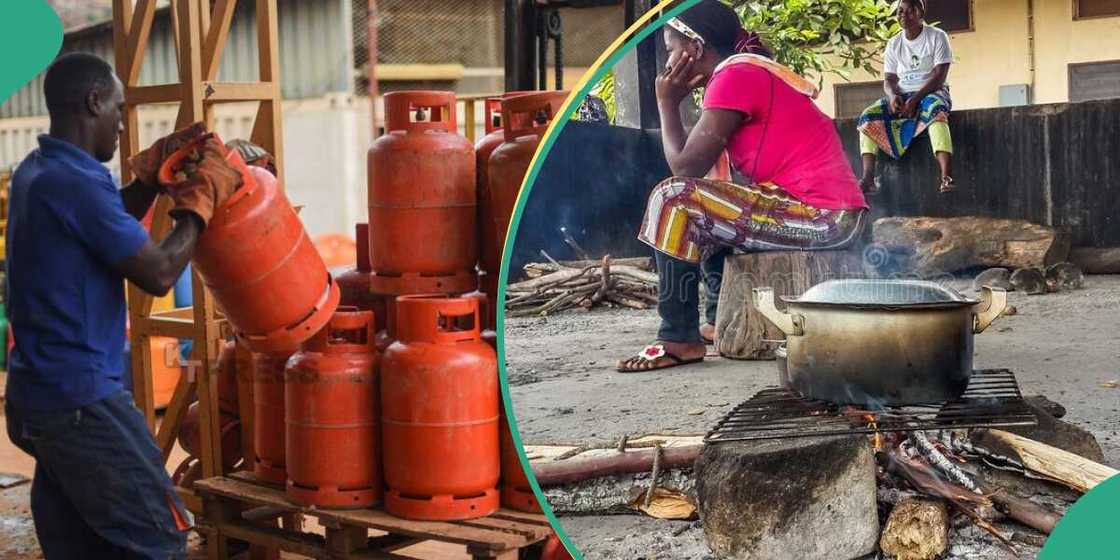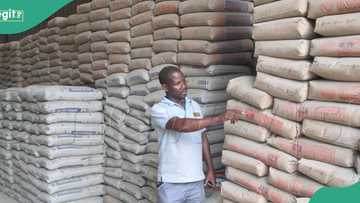Cooking Gas Demand Declines as Nigerians Seek Kerosene, Charcoal, Firewood Alternatives
- Retailers of cooking gas have lamented a sudden decline in patronage amid a rise in the prices of the product
- According to depot owners, the rise in the prices of cooking gas is a result of the depreciation of forex rate
- The development has forced many Nigerians to seek alternatives, including kerosene, charcoal and firewood
Legit.ng journalist Victor Enengedi has over a decade's experience covering Energy, MSMEs, Technology and the Stock Market.
The demand for Liquefied Petroleum Gas (LPG), commonly known as cooking gas, has experienced a decline amidst increasing living expenses.
This development comes despite numerous efforts by the Federal Government to enhance supply and encourage domestic usage.
The Nigerian Bureau of Statistics recently released data indicating a rise in the inflation rate from 28.92% in December 2023 to 29.90% in January 2024.
Subsequent market surveys have shown an increase in the price of 1kg of cooking gas, which has escalated from approximately N1,000 in January to around N1,200, varying depending on location.

Source: UGC
Decline in cooking gas demand
According to reports, the demand for cooking gas has dwindled, primarily attributed to the escalating inflation rate, which has consequently reduced consumers' purchasing ability.
A retailer in Lagos said that general inflation and the rising cost of gas have forced many to seek alternatives to cook their food.
He said:
“We are now experiencing low demand from consumers because inflation has pushed prices of goods and services above what the common man can bear.”
Increase in landing cost of natural gas
Reliable sources have informed that two 20-ton vessels belonging to the Nigerian Liquefied Natural Gas Limited are presently unloading products at the Lagos port, with each vessel incurring a landing cost of N21 million.

Read also
Looming fuel scarcity as tanker drivers threaten to stop lifting petrol, announce shutdown date
This translates to an estimated landing cost of N1,000 per 1kg unit of cooking gas.
According to information from a reliable insider, intermediaries are currently selling a 20-ton vessel of cooking gas for prices ranging between N22 million to N23 million.
This situation exacerbates the challenges faced by retailers, who are compelled to transfer these elevated costs to consumers, thereby worsening their economic burdens.
The source said:
“If the landing cost is N1,000 per 1 kg, how much will the product now be sold at to marketers? The gas market is no longer attractive because consumers no longer patronise us. Most people now go for either charcoal or firewood or at best kerosene.”
Dapo Olatunbosun, the President of the Nigerian Association of Petroleum and Gas Marketers, informed Channels Television that current prices are dictated by a combination of escalating inflation and market dynamics, in contrast to the previous year when middlemen had a significant influence on pricing.

Read also
Petrol subsidy nears N1 trillion, higher than Buhari's era as NNPC finally speaks on 'new' price
He said:
“NLNG’s supplies have been consistent, and middlemen haven’t been able to influence prices like before because we have not been keeping quiet. It could have been worse if we had not spoken up.”
This development follows Olatunbosun's previous warning that the cost of a 12.5kg cylinder of cooking gas might surge to N18,000 if the government didn't intervene to address the ongoing price increases instigated by intermediaries.
Depot owners attributed the significant rise in prices to the depreciation of the foreign exchange rate and the uptick in prices on the international market.
Expert explains why cooking gas is expensive
In related news, Legit.ng reported that an expert has provided insight into why government efforts are not working to bring down the price.
Speaking on the price changes, Dr Ayo Anthony, an economist, explained that it will take time for government policies to impact the economy.

Read also
Nigerians groan as cement price hits new High in 6 days as inflation rises to highest in 17 years
Anthony said the issue of old gas stock contributed to the high cost of cooking gas in the Yuletide, despite the government's policy to remove VAT from its importation.
He said cooking gas that marketers had stocked before the policy pronouncement would still be sold during the Yuletide at the old price to cover the cost of importation.
PAY ATTENTION: Unlock the best of Legit.ng on Pinterest! Subscribe now and get your daily inspiration!
Source: Legit.ng


